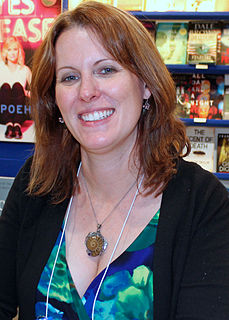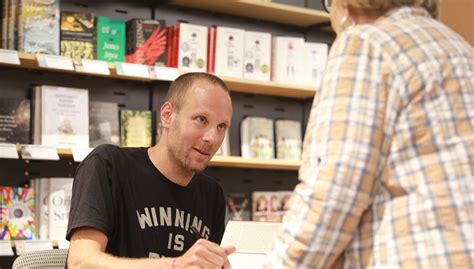A Quote by Amanda Hocking
Right then, it didn't matter what his reasons were. All I knew that I was sick of him breaking my heart.
Related Quotes
I knew right then you were the only one for me." He pulled her hand from his face, kissed her palm, then pressed it flat against his chest. "Beatings, battles, fights. No matter how bleak the circumstance, no matter how my soul despaired ... this heart never once gave up." His voice deepened, went thick with emotion. "I've a theory as to why. Do you want to hear it?" She nodded. "This heart is yours. It's yours," he said. "It always will be.
His master’s pain was his pain. And it hurt him more for his master to be sick than for him to be sick himself. When the house started burning down, that type of Negro would fight harder to put the master’s house out than the master himself would. But then you had another Negro out in the field. The house Negro was in the minority. The masses—the field Negroes were the masses. They were in the majority. When the master got sick, they prayed that he’d die. If his house caught on fire, they'd pray for a wind to come along and fan the breeze.
In that hour of trial it was the love of his master that helped most to hold him firm; but also deep down in him lived still unconquered his plain hobbit-sense: he knew in the core of his heart that he was not large enough to bear such a burden, even if such visions were not a mere cheat to betray him.
We had to do something at [a festival in Washington, D.C.]. I remember Chris Martin, by then we all knew him, there were certain people who were regulars. He would say, "Oh, my God, you guys, I think I'm going to throw up." It was a daytime festival, and they went on right after some really heavy band, and he was saying, "I don't think I can do this. I think I'm going to throw up." He was in the bathroom thinking he was going to be sick. He said, "They're going to hate us." In fact, they hated them. They hated Coldplay - did not go over well. His instincts were correct.
For a split second longer she stood motionless. Then, somehow, she had caught at the front of his shirt and pulled him toward her. His arms went around her, lifting her almost out of her sandals, and then he was kissing her—or she was kissing him, she wasn’t sure, and it didn’t matter. The feel of his mouth on hers was electric; her hands gripped his arms, pulling him hard against her. The feel of his heart pounding through his shirt made her dizzy with joy. No one else’s heart beat like Jace’s did, or ever could.
And as he drove on, the rainclouds dragged down the sky after him, for, though he did not know it, Rob McKenna was a Rain God. All he knew was that his working days were miserable and he had a succession of lousy holidays. All the clouds knew was that they loved him and wanted to be near him, to cherish him, and to water him.
At first, man was enslaved by the gods. But he broke their chains. Then he was enslaved by the kings. But he broke their chains. He was enslaved by his birth, by his kin, by his race. But he broke their chains. He declared to all his brothers that a man has rights which neither god nor king nor other men can take away from him, no matter what their number, for his is the right of man, and there is no right on earth above this right. And he stood on the threshold of freedom for which the blood of the centuries behind him had been spilled.
Woodrow Wilson was the president of the United States in 1920, and he was made a fool of - his wife almost divorced him - because he wouldn't support women's suffrage. He was president during World War I, but I look back upon him as a coward. Because he knew the right thing to do - the right of women to vote was an idea whose time had come a long time before then, when a lot of women were put into prison or persecuted because they fought for it.
I reached out to [Brett Favre] early on; sent him some of my books and a letter. Then I had two or three arranged times with him, and was blown off. Then I sent him another letter, and he sent me a text, explaining that he didn't wish to talk. I'm not mad - it's his right, obviously. Plus, his family members were amazingly open and cool.
She saw him the first day on board, and then her heart sank into her shoes as she realized at last how much she wanted him. No matter what his past was, no matter what he had done. Which was not to say that she would ever let him know, but only that he moved her chemically more than anyone she had ever met, that all other men seemed pale beside him.





































